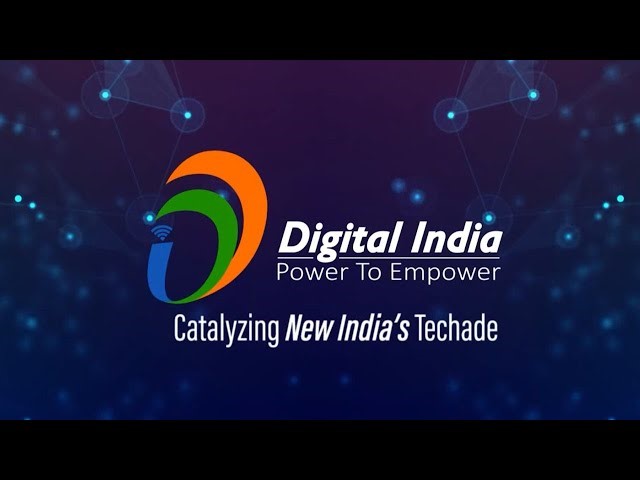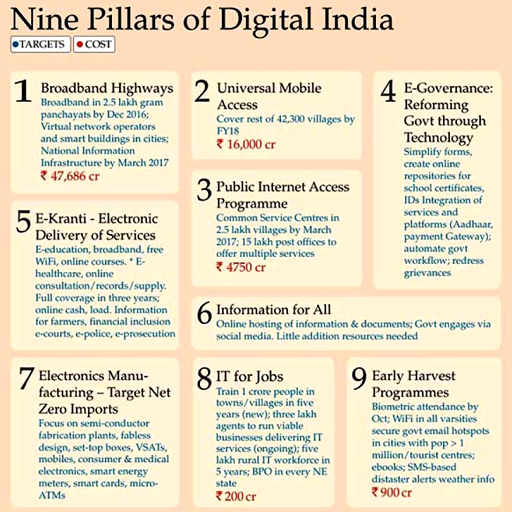
Disclaimer: Copyright infringement not intended.
Context
- Disruptive technology is an innovation that significantly alters the way that consumers, industries, or businesses operate.
Details:
- MeitY receives almost a 50% boost in its 2024-2025 Budget outlay of Rs 21,385 crore.
- Corpus of ₹1 lakh crore to fund tech research. Rs 6,903 crores allocated for semiconductor and display manufacturing.
- Rs 6,200 crore for the production-linked scheme (PLI) to promote electronics manufacturing.
- National Quantum Mission gets a massive boost with Rs 477-crore allocation in budget.
- 71% increase in outlay for chip, and electronics manufacturing.
- Allocation for cyber security projects received a sharp boost to Rs 759 crore.
INTRODUCTION:
- India's technological landscape has witnessed significant transformations over the past decade, marking it as a period of remarkable growth and innovation. From advancements in information technology to breakthroughs in renewable energy and space exploration, the country has made substantial strides in various sectors.
- Techade, a fusion of technology and decade, signifies an era driven by technological advancements. The concept gained prominence before the global disruption caused by the COVID-19 pandemic, which heightened the urgency and role of technology in addressing humanity's challenges.
India's Emergence as an Innovation Hub:
- India is swiftly emerging as a global hub for innovation, with numerous Fortune 500 companies establishing research and development (R&D) centers in the country. These centers, far from being mere back offices, lead the forefront of innovation initiatives for these companies, showcasing India's prowess in driving technological advancements on a global scale.
Digital India Programme:
- A significant initiative in India's technology adoption journey is the Digital India program, a flagship initiative of the Government of India aimed at transforming the nation into a digitally empowered society and knowledge economy. This program focuses on leveraging technology to enhance governance, empower citizens, and drive socio-economic development.
Vision for India's Techade:
- In July 2021, the Prime Minister of India articulated a vision for the decade 2021-2030 as India's Techade. This vision emphasizes harnessing India's data and demographic dividend along with its proven technological capabilities to propel the country's growth and development.
Financial Inclusivity Initiatives:
- India has demonstrated exemplary success in driving financial inclusivity initiatives, reaching a population of approximately 1.4 billion. Initiatives like the Jan Dhan Yojana have led to the opening of over 430 million bank accounts, ensuring that over 80% of Indians now have access to banking services. Additionally, India's flagship digital payments platform, the Unified Payments Interface (UPI), has recorded record-breaking transactions, showcasing the widespread adoption of digital payment solutions.
Human-Centric Impact of Techade:
- Amidst India's journey towards Techade, it is imperative to ensure that technology adoption is human-centric, focusing on delivering meaningful impact to individuals and communities. This entails leveraging technology to address societal challenges, improve quality of life, and promote inclusive growth.

Key dimensions of India's technological decade, exploring its achievements, challenges, and prospects:
Information Technology (IT) Sector:
- India emerged as a global leader in IT services, with its software industry becoming a cornerstone of the economy.
- The rise of Indian IT companies such as Tata Consultancy Services (TCS), Infosys, and Wipro showcased the country's prowess in software development, outsourcing, and digital transformation.
- Initiatives like Digital India and Make in India further propelled the growth of the IT sector, fostering innovation and entrepreneurship.
Telecommunications:
- The proliferation of mobile technology and the advent of affordable smartphones revolutionized connectivity across the country.
- India witnessed a surge in internet penetration, with millions of people gaining access to digital services and online platforms.
- The launch of 4G networks and the impending rollout of 5G technology are poised to accelerate India's digital transformation and foster inclusive growth.
Renewable Energy:
- India made significant strides in renewable energy adoption, aiming to reduce its dependence on fossil fuels and combat climate change.
- Ambitious targets were set for solar and wind energy generation, leading to increased investments in clean energy infrastructure.
- Initiatives like the International Solar Alliance (ISA) and the National Solar Mission propelled India's position as a global leader in renewable energy deployment.
Space Exploration and Research:
- The Indian Space Research Organisation (ISRO) achieved several milestones in space exploration, including successful satellite launches, lunar missions, and Mars orbiter missions.
- ISRO's cost-effective approach and indigenous technology development garnered international recognition and positioned India as a key player in the global space race.
- Collaborations with other space agencies and private sector partnerships paved the way for future space exploration endeavors.
Healthcare and Biotechnology:
- India witnessed advancements in healthcare and biotechnology, with a focus on research, innovation, and affordable healthcare solutions.
- Initiatives like Ayushman Bharat and the National Health Mission aimed to enhance healthcare access and improve healthcare infrastructure across the country.
- Biotech startups and research institutions contributed to breakthroughs in areas such as genomics, pharmaceuticals, and medical devices.

Key Challenges in Technological Advancement:
- Digital Divide: Despite significant progress, a substantial portion of India's population still lacks access to digital technologies and the internet. Rural areas, in particular, face challenges in infrastructure development, connectivity, and affordability, leading to a digital divide between urban and rural populations.
- Cybersecurity Threats: With the rapid digitization of various sectors, cybersecurity has emerged as a critical concern. India faces cybersecurity threats such as data breaches, malware attacks, phishing, and ransomware, posing risks to individuals, businesses, and government organizations.
- Infrastructure Gaps: Infrastructure deficiencies, including inadequate power supply, limited broadband connectivity, and poor road networks, hinder the adoption and diffusion of technology across the country. Addressing these gaps is crucial for ensuring seamless technology integration and accessibility.
- Skilled Workforce Shortage: The technology sector in India faces a shortage of skilled professionals with expertise in emerging technologies such as artificial intelligence, machine learning, and cybersecurity. Bridging this skills gap through quality education and training programs is essential for sustaining technological growth.
- Regulatory Challenges: Complex regulatory frameworks and bureaucratic hurdles often impede innovation and hinder the growth of technology startups and businesses. Streamlining regulations, promoting ease of doing business, and fostering a conducive regulatory environment are imperative for fostering innovation and entrepreneurship.
- Digital Literacy: Despite advancements, a significant portion of India's population lacks basic digital literacy skills, limiting their ability to fully utilize and benefit from digital technologies. Promoting digital literacy programs and initiatives is essential for empowering individuals and bridging the digital divide.
- Data Privacy Concerns: With the proliferation of digital platforms and services, data privacy has become a pressing concern. India lacks comprehensive data protection laws, leading to challenges related to data privacy, surveillance, and misuse of personal information.
Impediments to Fulfilling the Idea of Techade:
Brain Drain:
- India's inability to capitalize on market-driven growth opportunities has led to a brain drain, with talented individuals seeking job opportunities abroad, particularly in the U.S.
- As of 2019, there were 2.7 million Indian immigrants in the U.S., comprising highly educated and professionally accomplished individuals.
Gradual Decline in R&D Spending:
- India's research and development (R&D) spending as a proportion of GDP has gradually declined since 1991, reaching 0.65% in 2018.
- In contrast, countries like China and South Korea have significantly increased their R&D spending, reaching 2.1% and 4.5% of GDP, respectively, by 2018.
Lesser Public Spending for Tertiary Education:
- A significant proportion of tertiary students in India are enrolled in private institutions, with 60% enrolled for bachelor's degrees in 2017.
- This is higher than the average for G20 countries, which stands at 33%, indicating lesser public spending on tertiary education.
High Import of Electronic Items:
- India is a large market for new technologies, yet the domestic industry has not fully capitalized on this opportunity.
- The country's electronic manufacturing sector operates below its potential, leading to high imports of electronic goods and components, which contribute significantly to the import bill.
Other Roadblocks:
- Challenges such as digital illiteracy, poor infrastructure, low internet speed, connectivity issues, lack of coordination among departments, and taxation issues hinder the successful implementation of initiatives like the Digital India Programme.
Key Elements of the Tech Revolution:
Disruption:
- Embracing disruption is essential for the technology, necessitating a complete change in traditional industry operations through innovative methods and technologies.
Innovation and Impact:
- Innovation should focus on solving real-life problems and making a tangible impact, moving from potential to practical solutions.
Inclusivity:
- The techade must prioritize inclusivity, ensuring that technological advancements benefit all segments of society and contribute to achieving the Sustainable Development Goals (SDGs).
Ethical Use of Tech:
- Governments must ensure the ethical use of technology, prioritizing human-centric design and minimizing risks associated with technology adoption.

Key Areas of Focus:
Global Standards:
- India should actively participate in and shape global standards related to privacy, data localization, tax laws, cybersecurity, and regulations to leverage the full potential of the technology.
Growth Opportunities:
- Opportunities abound in green technology, the Internet of Things (IoT), artificial intelligence (AI), cybersecurity, blockchain, and other emerging technologies, which can drive significant economic growth.
Public Spending on Education:
- Increased public spending on education is crucial to deepen India's technological capabilities and foster innovation, particularly in universities and public institutions.
Strengthening the Public Sector:
- A strengthened public sector can create opportunities for private businesses and support small and medium entrepreneurs through technology diffusion and access to credit and assistance.
CITATIONS:
https://sansadtv.nic.in/episode/indias-techade-exclusive-conversation-with-rajeev-chandrasekhar-mos-electronics-it
https://sansadtv.nic.in/episode/sansad-tv-special-journey-of-digital-india-02-december-2023
https://www.thehindu.com/opinion/op-ed/the-need-for-sector-specific-safeguards-in-techade/article66672731.ece
https://www.thehindu.com/opinion/open-page/the-rise-of-technology/article67386119.ece
https://www.thehindu.com/business/Industry/india-transformed-in-less-than-a-decade-morgan-stanley/article66915607.ece
https://indianexpress.com/article/explained/explained-economics/global-investors-concerns-indian-economy-9112774/
https://indianexpress.com/article/business/budget/india-gdp-economic-growth-in-fy-2024-25-9132738





